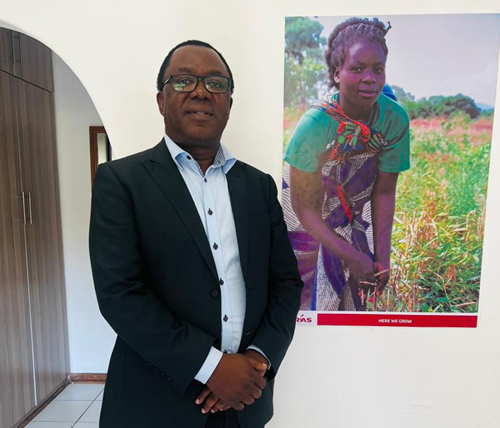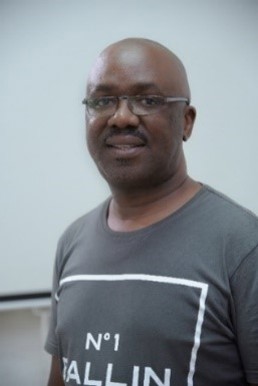A lifestyle rooted in fairness and justice

Jimmy Daka, Country Director of NIRAS Zambia, has built his career on a commitment to community development. From his roots in rural Zambia to his current role at NIRAS, his journey is a compelling narrative of professional and personal growth.
Born in Lusaka, Jimmy Daka grew up in the central part of Zambia where his parents worked on a commercial farm, providing a modest but stable upbringing. The fourth child of nine, Jimmy's formative years were deeply influenced by his interactions with friends who came from small villages in the surrounding area, grounding him in the realities of what was a mostly rural life.
The memories of these early years have stayed with Jimmy and are the backbone of his commitment to rural development. "Working on rural projects takes me back to that time and gives me hope that there is something we can do to change these areas for the better," he says. “I am proud to work for NIRAS as part of what we do centres around supporting communities, training farmers, strengthening rural farmer and business groups (cooperatives) and improving agricultural productivity.”
Education was a priority for Jimmy’s father who was determined to see him and his siblings succeed. "My father used to say, 'No matter what happens, you need to finish at least your secondary school,'" Jimmy recalls. A decisive moment came when his grade 7 teacher urged him to attend a boarding school, believing it would provide better opportunities.
“I almost didn’t go because, on the way to my high school, I was involved in traffic accident and lost the money my father had set aside for my school fees. People said, ‘Maybe you are just not meant to go,’ but my father insisted. He sold his sewing machine and after that did everything, he could to pay the fees,” he explains.
Jimmy made his own way through university, where he studied accounting and finance-related training at the National Institute for Public Administration. Initially he had planned to study telecommunications at Copperbelt University, but that never materialised as his brother died unexpectedly and the funds set aside for fees were needed to cover funeral costs. When he did eventually go, he had to take eight months off to work on a farm near Lusaka to pay for his studies.
NIRAS works in a unique way. There is not too much hierarchy, age doesn't necessarily mean seniority. A younger person can lead if they are competent. That's what I like about this organisation. We provide a platform to learn. That's the spirit of how NIRAS operates.
Jimmy Daka, NIRAS Zambia Country Office Director
Jimmy's start with NIRAS was somewhat fortuitous. Initially a Finance Officer for a local NGO, then funded by Hivos (a Dutch organisation) and Oxfam to advocate for fair trade for smallholder farmers (especially those in cotton production), in the absence of his sick boss, Jimmy was asked if he could take on some project management-related tasks. Enjoying this work, he went on to complete training in project management as well as monitoring and evaluation. He came across NIRAS through a consultancy assignment for the evaluation of the Sida-funded Agriculture Support Programme (ASP), where he supervised a data collection team that covered the southern province.
“I travelled all over southern Zambia with the lead consultant. A few weeks later, the client requested us to collect data from additional districts and the lead consultant recommended me as a field coordinator along with another team member. After that, NIRAS hired me from time to time on different assignments and, a year later in 2012, I was offered a part-time position as a project officer. I have been with the organisation ever since.”
Transitioning to a full-time staff position, Jimmy's expertise expanded. He took part in the NIRAS Young Professionals Academy, a two-year talent programme to educate the development consultants of the future. Since then, he has juggled bidding preparations, marketing and business development roles, and been NIRAS project manager for significant projects like the IFAD-funded S3P-Strengthening Farmer Organisations and the World Bank's Zambia Agribusiness and Trade Project, which aimed to build business linkages and capacities of farmer organisations and other agribusiness actors.
Since 2022, he has been NIRAS Country Office Director for Zambia responsible for a full-time team of seven and supporting experts on several in-country and regional bids and projects like the Swiss-funded Market Access and Seeds Project in Zambia and Zimbabwe and Climate Just Communities, a flagship programme funded by the Scottish Government under the Climate Justice Fund in Malawi, Rwanda and Zambia. He is currently the project manager for the EU's support to the National Assembly of Zambia project, which aims to strengthen Parliamentary economic and public financial management oversight.
One of Jimmy’s significant contributions at NIRAS has been his role in nurturing a young and dynamic team, many of whom started as interns. "We deliberately brought in younger employees, giving them an opportunity to grow," Jimmy explains. "NIRAS works in a unique way. There is not too much hierarchy, age doesn’t necessarily mean seniority. A younger person can lead if they are competent. That’s what I like about this organisation. We provide a platform to learn. That’s the spirit of how NIRAS operates.”
This strategy not only cultivates individual talent but also injects fresh ideas into the organisation. Jimmy’s approach underscores his belief in building capacity from within and fostering a collaborative environment, but it is also a reflection of his ethos.
“Although I don’t smoke weed, my lifestyle is very Rastafarian,” Jimmy laughs. “I have always believed in being fair and just to others, giving people a chance. I respect the environment, don’t eat meat, and love reggae. When I was younger, I attempted to keep some dreadlocks, but my mother asked me to cut them off as many people associated them with the smoking of weed. Because I have a lot of regard for my mother, I respected her wish.”
Jimmy’s mother, in fact, looms large in many of his decisions.
“She did not go far in school and even a basic education would have made her life very different. Today, she cannot read or write, and this causes a lot of problems for her. This is why I want to protect my mother from everything, I have to do all these small things for her. It is painful when I think about gender inequality, my eldest sister did not get the same opportunities I got, and many women are like my mother,” he reflects.
“I am very sensitive to the fact that I have two girls. I don’t want them to be subjected to anything my mother went through. I started an education policy for my three kids so that when it's time for university, the funds will be there."

While moving forward, Jimmy continues to look back. His desire to uplift rural communities in his professional life resonates with his upbringing. He sees a future for Zambian youth in agriculture and value addition, something he himself is very familiar with as an owner of a small farm that grows and processes groundnuts for peanut butter.
“The demand for farm products is very high. We have a unique ecological set up in Zambia. Young people can build capital through green marketing and aggregation. If they focus and do it right, that’s where the money is,” he says. “And many of the projects my team and I support are there to provide the technical assistance and training to help make that happen.”


